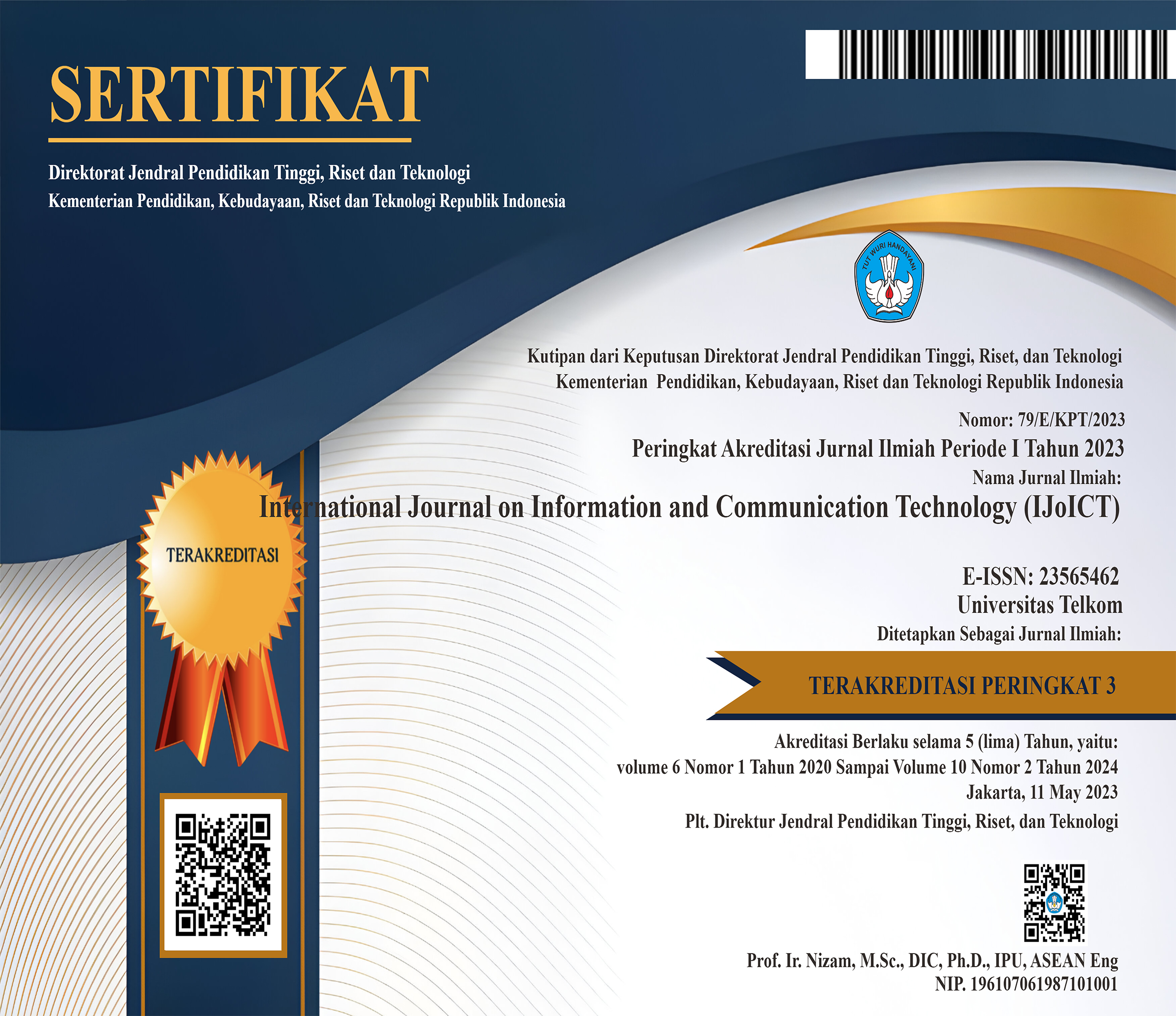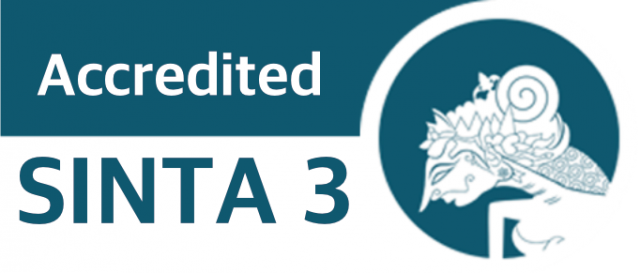
About the Journal
Focus and Scope
International Journal of Information Communication Technology (IJoICT) is a peer-reviewed Journal. This journal includes novel ideas on ICT, state of the art technique implementations, and study cases on developing countries. This journal fully acknowledges the articles that emphasize a balanced coverage between theory and practice.
Subject areas that is suitable for publication to the following fields:
- Computer Networking and Communication
- Graphics & Multimedia
- Theoretical CS & Statistic
- Embeded System
- Software Engineering
- Information System
- Security & Cryptography
- Computational Science
- Parallel and Distributed Systems
- Database Systems
- Intelligence System
Peer Review Process

Peer review is a process of evaluating and validating a scholarly work by one or more people of similar competence to the work. Authors should submit original manuscript without any plagiarism and inappropriate data manipulation. The Chief Editor will screen the manuscript to ensure basic scientific criteria. The manuscript is further checked by the editorial staffs for English writing quality and typesetting. After the first screening, each submitted manuscript will be reviewed by at least two reviewers and optionally, one additional reviewer if the first two show strong different recommendations. This journal follows double blind scheme for reviewing process, meaning that both authors and reviewers are anonymous. Base on the results of the peer review, the Chief Editor will notify the author via email whether the manuscript is accepted, rejected, or required more revision. Should the manuscript require revisions, the authors must correctly and completely address the reviewers’ comments before resubmitting.
Publication Frequency
IJoICT is open for author to submit publication article. The article will be processed on the First-Come First-Served policy via IJoICT submission webpage. There are two deadlines for article submission, which are 15 May & 15 November. IJoICT continuously published two volumes in a year, on June and December.
Open Access Policy
All articles in open access journals which are published by IJoICT have undergone peer review and upon acceptance are immediately and permanently free for everyone to read and download from this link
Ethics and Malpractice
Our publication ethics and malpractice statement mainly based on COPE’s Best Practice Guidelines for Journal Editors.
Duties of Editors :
- Publication Decision
The editor of the journal is responsible for deciding which of the articles submitted to the journal should be published.
- Fair Play
The editor must ensure that each manuscript is evaluated for its intellectual content without regard to sexual orientation, gender, race, religious belief, ethnic origin, citizenship, or political philosophy of the authors.
- Confidentiality
The editor and any editorial staff must not disclose any information regarding manuscripts submitted by the authors to anyone other than corresponding author, reviewers, potential reviewers, other editorial advisers, and the publisher, as appropriate.
- Disclosure and Conflicts of Interest
Unpublished materials disclosed in a submitted manuscript must not be used by the editor or the members of the editorial board for their own research purposes without explicit written consent of the author.
Duties of Reviewers :
- Contribution to editorial decision
The peer-reviewing process assists the editor and the editorial board in making editorial decisions and may also serve the author in improving the manuscript.
- Promptness
Any selected referee who feels unqualified to review the research reported in a manuscript or knows that its prompt review will be impossible should notify the editor and withdraw from the review process.
- Confidentiality
Any manuscripts received for review must be treated as confidential documents. They must not be disclosed to or discussed with others except as authorized by the editor.
- Standards of Objectivity
Reviews should be conducted objectively. Personal criticism of the author is inappropriate. Referees should express their views clearly with supporting arguments.
- Acknowledgement of Source
Reviewers should identify cases in which relevant published work referred to in the manuscript has not been cited in the reference section. They should point out whether observations or arguments derived from other publications are accompanied by the respective source. Reviewers will notify the editor of any substantial similarity or overlap between the manuscript under consideration and any other published manuscript of which they have personal knowledge.
- Disclosure and Conflict of Interest
Privileged information or ideas obtained through peer review must be kept confidential and not used for personal advantage. Reviewers should not consider manuscripts in which they have conflicts of interest resulting from competitive, collaborative, or other relationships or connections with any of the authors, companies, or institutions associated with the manuscripts.
Duties of Authors :
- Reporting Standards
Authors should present an accurate account of their original research as well as an objective discussion of its significance. Underlying data should be represented accurately in the manuscript. A manuscript should contain sufficient detail and references to permit others to replicate the work. Fraudulent or knowingly inaccurate statements constitute unethical behavior and are unacceptable. Manuscripts will follow the submission guidelines of the journal (See submission guideline policies).
- Data Access and Retention
Authors could be asked to provide the raw data of their study together with the manuscript for editorial review and should be prepared to make the data publicly available if practicable. In any event, authors should ensure accessibility of such data to other competent professionals for at least five years after publication (preferably via an institutional or subject-based data repository or other data center), provided that the confidentiality of the participants can be protected and legal rights concerning proprietary data do not preclude their release.
- Originality and Plagiarism
Authors must ensure that they have written entirely original work, and if the authors have used the work and/or words of others that this has been appropriately cited or quoted. Publications that have been influential in determining the nature of the reported work should also be cited.
- Multiple, Redundant or Concurrent Publication
Authors should not submit the same manuscript to more than one journal concurrently. It is also expected that the author will not publish redundant manuscripts or manuscripts describing the same research in more than one journal. Parallel submission of the same manuscript to more than one journal constitutes unethical publishing behavior and is unacceptable.
- Acknowledgement of Sources
Authors should acknowledge all sources of data used in the research and cite publications that have been influential in the research work.
- Authorship of the Manuscript
Authorship should be limited to those who have made a significant contribution to conception, design, execution or interpretation of the reported study. Others who have made significant contribution must be listed as co-authors. Where there are others who have participated in certain substantive aspects of the research project, they should be named in an Acknowledgement section. Authors also ensure that all the authors have seen and agreed to the submitted version of the manuscript and their inclusion of names as co-authors.
- Disclosure and Conflicts of Interest
All authors should disclose in their manuscript any financial or other substantive conflict of interest that might be construed to influence the results or their interpretation in the manuscript. All sources of financial support for the project should be disclosed.
- Fundamental Errors in Published Works
If at any point of time, the author(s) discovers a significant error or inaccuracy in submitted manuscript, then the error or inaccuracy must be reported to the editor.
Withdraw Submission
Some authors request withdrawal of manuscript after submission. If the withdrawal is done within the time span when the article is with Editor, and for a genuine reason like problems discovered in data etc., author is allowed to withdraw the manuscript without any penalty.
If the author withdraws manuscript any time after the manuscript has been sent to peer review till the final decision, then unless there are compelling reasons, the request is not entertained without a penalty. This penalty costs Rp1.000.000 paid to journal for its time and resources spent.
Final Paper Preparation
Instructions for Final Manuscript Preparation
When your paper is accepted for publication in IJoICT, please follow the instructions below to prepare your final manuscript. Please proofread your paper carefully before the final submission, including the paper title and section titles.
Style Files
You are encouraged to use Microsoft Word documents, you can download Microsoft Word template from here.






.png)

.jpg)




